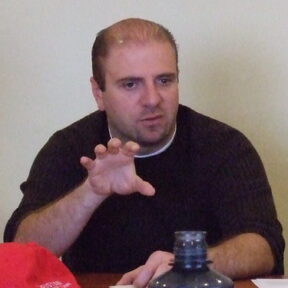
Sami Awad
: Photo from Creative Commons / Author of Photo: delayed gratificationOverview
* Executive Director of the Holy Land Trust
* Describes Israel’s anti-terrorism separation barrier in the West Bank as an “apartheid wall”
Sami Awad is the Executive Director of the Holy Land Trust (HLT). He formerly headed the Palestine Children’s Welfare Fund.
Awad holds a bachelor’s degree in Political Science from the University of Kansas, and a master’s degree in International Relations (with a focus on Peace and Conflict Resolution) from the American University in Washington, DC. After residing in the United States for nearly ten years, says the HLT website, Awad returned “to his homeland of Palestine in 1996.” Today he conducts frequent speaking tours in the United states and other nations.
Awad refers to Israel’s anti-terrorism separation barrier in the West Bank as an “apartheid wall” that represents an egregious affront to the human rights and the dignity of Palestinians, whose daily life he describes as follows:
“As you can guess, we do live a difficult life under [Israeli] occupation…. [I]t is not just the issue of the military violence that we face and have to deal with on a daily basis. It is also the structural violence. The occupation has created an entire structure where every aspect of our lives is controlled: our movements, our food supplies, our electricity comes from Israel, our water comes from Israel…. The difficulty is that the way the media perceives this and the way the Israeli government tries to show this is that all these measures are taken for security. What is the security when we have a checkpoint between two Palestinian villages or towns? It is more of an insulting act against the Palestinians and a demonising act for the Palestinians. That’s how we feel it.”
Vis a vis the 2006 electoral victory that gave Hamas a leading role in the Palestinian Authority government, Awad said: “The victory of Hamas happened in a fair and democratic election.” He chastised Israel and “the international community” for boycotting the triumphant Hamas and thereby allegedly missing a golden “opportunity” to negotiate for peace with the organization whose raison d’etre is to bring about Israel’s ultimate annihilation. Stated Awad: “As soon as Hamas became engaged in the political process, many of us in Palestine said, ‘Take advantage of this. Don’t throw them back in the corner.’”
In December 2004 Awad wrote that the second Palestinian Intifada, or uprising (in 2000), was a result of “the failure of the peace process” and was initially characterized exclusively by “non-violent forms of [Palestinian] resistance.” It became the provence of numberless suicide bombers and snipers, he said, only after a “brutal and forceful” first response by the Israeli military. That response, explained Aossey, “convinced some groups within the Palestinian community that only the use of arms and suicide attacks to balance out the pain being heaped upon Palestinians would be effective in making the occupation as costly as possible to the Israeli public.”